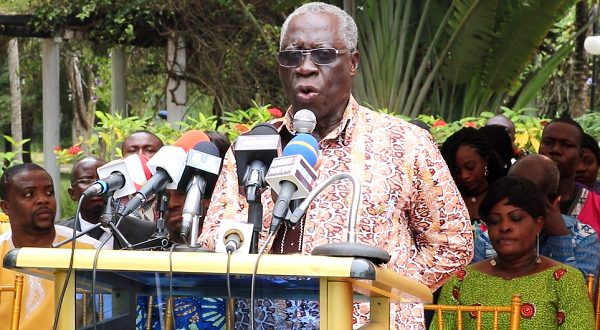Ghana’s senior presidential advisor, Yaw Osafo-Maafo has said that the government cannot provide subsidies for petroleum products in Ghana.
Osafo-Maafo maintains that the Ghanaian economy cannot “stomach” any form of incentive to fuel.
“There is no way the economy can provide subsidy to fuel,” the former Finance Minister told Asaase Radio’s Beatrice Adu, adding “it’s a commodity we don’t produce, others produce and we buy. And therefore, we should at best buy it at the cost price.”
“The economy cannot and I repeat, cannot stomach [fuel] subsidy. People should pay for it. You see, there are so many vehicles on the road and some of them need not be there. If you can’t afford to drive a 4-wheel drive, then you must not use it. We must now begin to look at situations of economic use of energy,” Osafo-Maafo said.
Listen to Osafo-Maafo in the attached audio below:
Scrapping taxes on petroleum products is not sustainable
Meanwhile, President Nana Addo Dankwa Akufo-Addo said removing taxes on petroleum products will not be sustainable in the long run.
His comment comes after several calls by labour unions for the government to scrap taxes on petroleum products to alleviate the plight of Ghanaians.
Addressing workers at this year’s May Day celebration on Sunday (1 May) on the theme “Protecting Jobs and Incomes in The Era of COVID-19 and Beyond”, Akufo-Addo said removing taxes on petroleum products will cut down the government’s revenue by GHC 4 billion.
“On the vexed matter of petroleum price increases, the suggestion that has been made, which has also been alluded to by the Secretary-General, is, at this moment, not a sustainable one.
“Removing taxes on petroleum products will reduce government revenues by some four billion cedis (GHC4 billion). At this time, when we are determined to expand Government revenues in order to increase our capacity to finance our own development, can we afford to reduce tax revenues by four billion cedis (GHC4 billion)?”
Akufo Addo added, “The government is currently confronted by very tight financing conditions, in the wake of inadequate domestic revenue mobilisation. Indeed, some of the revenues from these same taxes on petroleum products are what is used to pay some of the salaries of some of the seven hundred thousand (700,000) public sector workers on Government’s payroll.”
Source: Asaase Radio

Send your news stories to myghanamedia@gmail.com and Chat with us via WhatsApp on +233 200818719
 MYGHANAMEDIA.COM Best Source Of Latest News
MYGHANAMEDIA.COM Best Source Of Latest News





